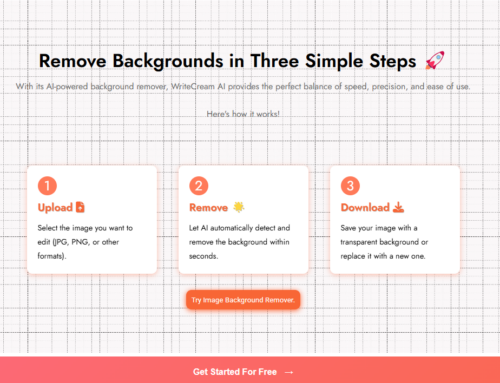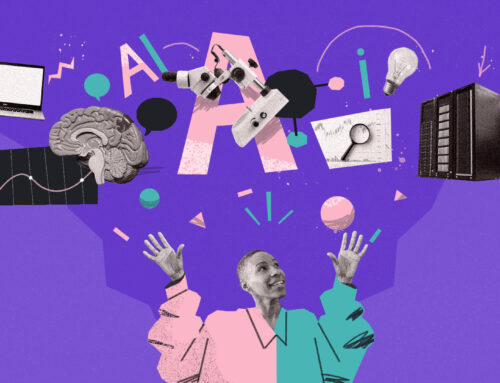Search engine optimization, or SEO for short, is a crucial component of any digital marketing or content marketing strategy. However, the plethora of tasks it involves, from performing keyword research and implementing web performance optimization techniques to adopting link-building tactics, may overwhelm even the most experienced marketers. Having the right tools on hand can streamline multiple processes and generate better results.
ChatGPT is a great example. Considering its vast capabilities, the AI-driven chatbot can make lots of SEO-related work much easier. In fact, 40% of marketers are actively using it to enhance their performance. In this article, we’ll explore ChatGPT’s inner logic and how to use ChatGPT for SEO.
Decoding the Inner Working of ChatGPT
Developed by OpenAI and launched in November 2022, ChatGPT is a large language model (LLM) trained on gigantic data sets and capable of analyzing and generating images, sound, voice, and text-based responses. What makes ChatGPT so powerful? We’ll discuss the technologies supporting the AI tool to better grasp its impressive possibilities.
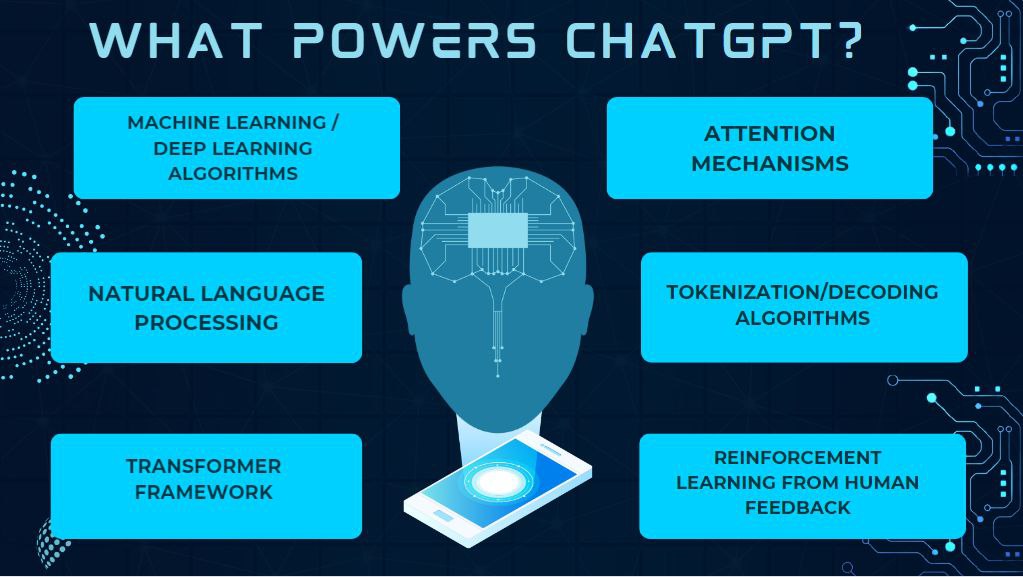
Machine Learning and Deep Learning
ML and DL algorithms allow ChatGPT to learn from massive datasets, identify patterns and relationships, and generate contextually relevant responses to user queries. For SEO, these technologies come in useful for:
- Analyzing search engine data and discovering niche topics.
- Create content of various formats (articles, infographics, social media posts, etc.)
- Evaluating website content (metadata, headings, keywords) and highlighting areas for optimization.
Natural Language Processing (NLP)
Thanks to NLP, ChatGPT can understand and interpret human language with high precision. In fact, it comprehends text in 95 languages and deciphers spoken words in 27 different languages. In the context of SEO, NLP assists in carrying out sentiment analysis and decoding user intent.
For example, if a user types in Google search console “best running shoes for beginners”, ChatGPT can interpret the query and suggest content ideas. SEO professionals may apply this information to attract relevant traffic to their website.
Transformer Framework
Transformers form the basis of ChatGPT. They are capable of processing sequential data (text, images, video) in the same way people read or understand the language.
Besides, transformers can store and connect past information within a document or conversation. Such “contextual awareness” is essential for ChatGPT, empowering it to give relevant responses and maintain a coherent conversation.
Regarding SEO, this mechanism helps ChatGPT grasp the semantic relationships between keywords and concepts and group similar topics together. Logical content organization, in turn, strongly impacts user experience and search rankings.
Attention Mechanisms
When analyzing data and generating responses, this component in the transformer architecture tells ChatGPT which words to concentrate on and which ones to skip. In the context of SEO, attention mechanisms make it possible for ChatGPT to identify long-tail keywords relevant to your business domain in the vast pool of search data.
Tokenization and Decoding Algorithms
ChatGPT employs tokenization (splitting text into smaller units called tokens) and decoding algorithms (interpreting the meaning of tokens) to formulate a pertinent answer. These features facilitate effective communication and contribute to understanding user input.
Reinforcement Learning from Human Feedback (RLHF)
RLHF is an integral part of the training process for the large language model. The essence is as follows: When ChatGPT generates a response based on the prompt it’s fed into, experts/testers/users evaluate the output data. The conversational chatbot analyzes human feedback and applies this information to provide the most accurate, valuable, and unbiased answers.
Boosting Performance Using ChatGPT For SEO
A well-planned SEO strategy aims to enhance website visibility, drive organic traffic, and earn higher rankings on search engine results pages (SERPs). ChatGPT doesn’t directly influence these factors, but it can be of great assistance in fulfilling certain aspects of your SEO game. Let’s talk about the best ways marketing teams can maximize their SEO efforts with ChatGPT.
Streamline Keyword Research
Generating content that earns high rankings is impossible without keyword research. It gives you an idea of what phrases and topics to target, as well as how to structure your text for maximum engagement and visibility.
ChatGPT is initially not a keyword research tool. However, it can be of great help for brainstorming ideas for seed keywords, long-tail phrases, and Latent Semantic Indexing (LSI) terms. In the prompt below, we asked the conversational chatbot to come up with long-tail queries for an article about healthy eating habits.
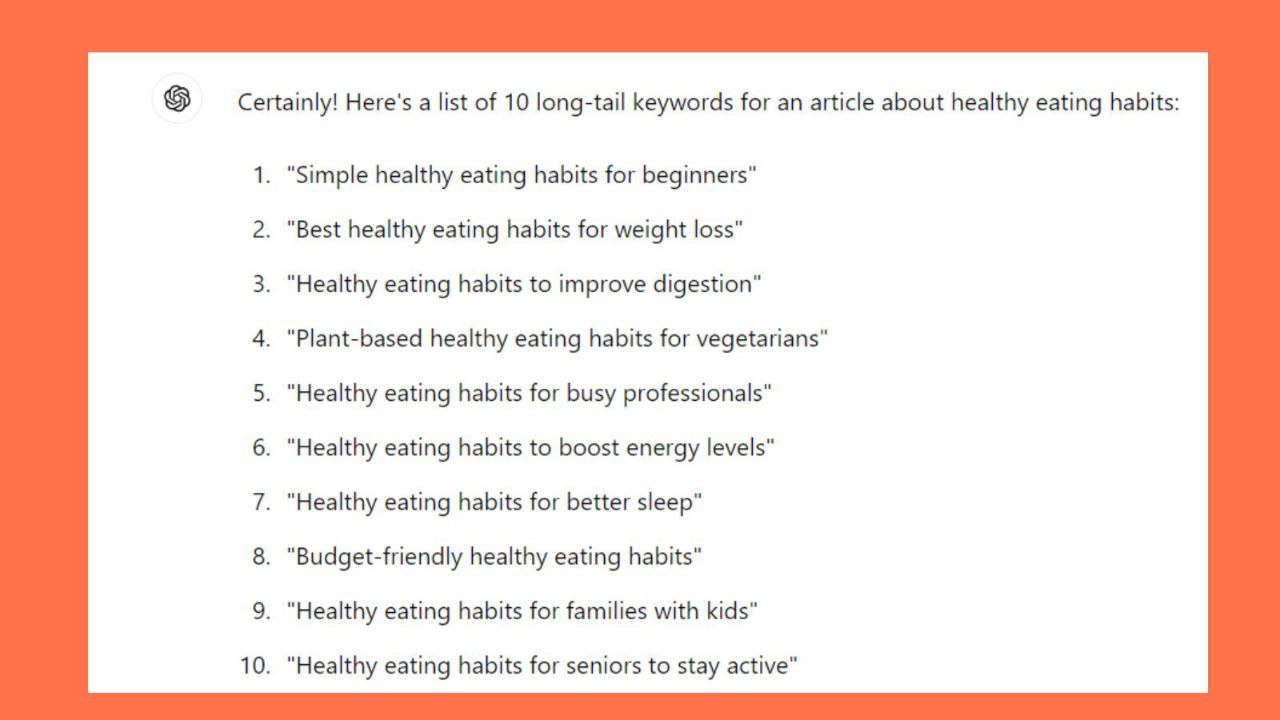
In a few seconds, ChatGPT draws up a list. Yet, it’s essential to double-check the results using reliable keyword research tools, like Ahrefs or SEMrush. These services can give you insights into search volume, competition, and other crucial points for the generated terms.
Brainstorm a List of Relevant Keywords For Content Creation
ChatGPT comes in handy when you need to spark ideas for a list of similar terms that you’re already targeting. These keywords can inspire new content themes for your website and ultimately expand your audience reach.
Let’s say you want to freshen up your blog post about “healthy recipes with gluten-free ingredients.” Asking ChatGPT for related keywords can suggest subtopics in your article users might be looking for.
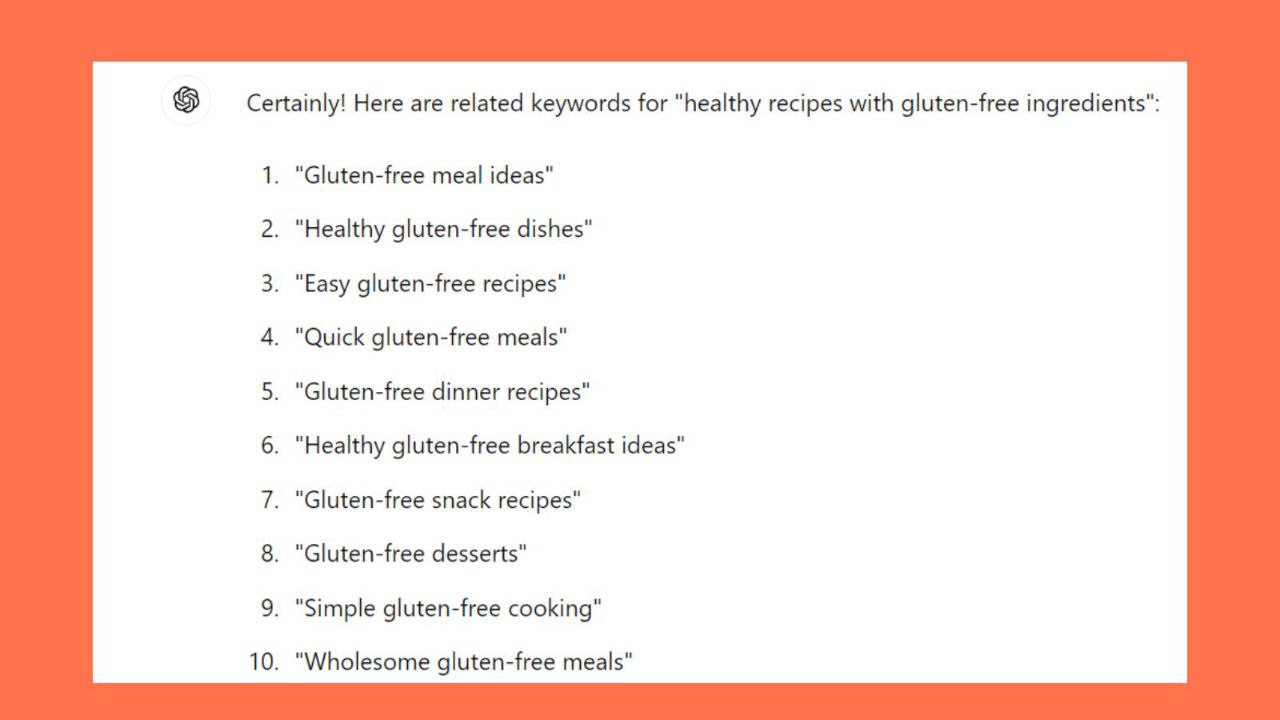
Classify Terms by Search Intent
Go beyond basic keyword research with ChatGPT and group terms by search intent. It’s the main goal a user wants to achieve when entering their query in Google. There are four common types of search intent:
- navigational (users look for a specific website: “Facebook”);
- informational (users want to find out more about something: “what is backlink profile”);
- commercial (users want to do research before buying a product: “best toaster”);
- transactional (people want to buy something: “Apple AirPods Pro2”).
A thorough understanding of search intent informs SEO marketers on how to create valuable and relevant content for their target audience. With ChatGPT, you can classify keywords in just a few clicks. The prompt below visualizes the process.
We asked the AI model to give relevant terms for “healthy eating habits” and arrange them in a table specifying the search intent for each word.
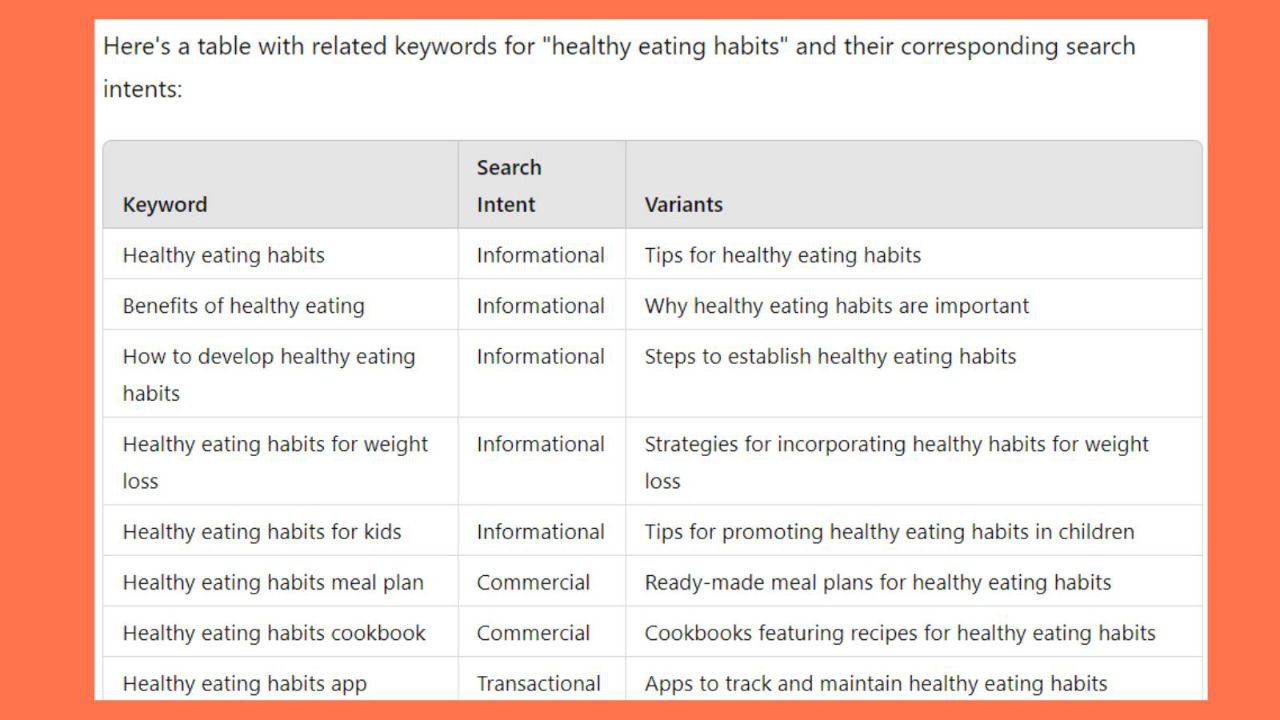
Develop Topic Clusters
Creating topic clusters to enhance internal linking is another possible use case scenario of ChatGPT for SEO. A topic cluster represents a group of interlinked web pages centered around a specific theme. Each cluster contains a pillar page. This page highlights the key points of the topic and links to other cluster pages covering more specific subtopics related to the main one.
We asked ChatGPT to brainstorm topic cluster ideas for the keyword “nutrition and diet.” Here’s what it came up with:
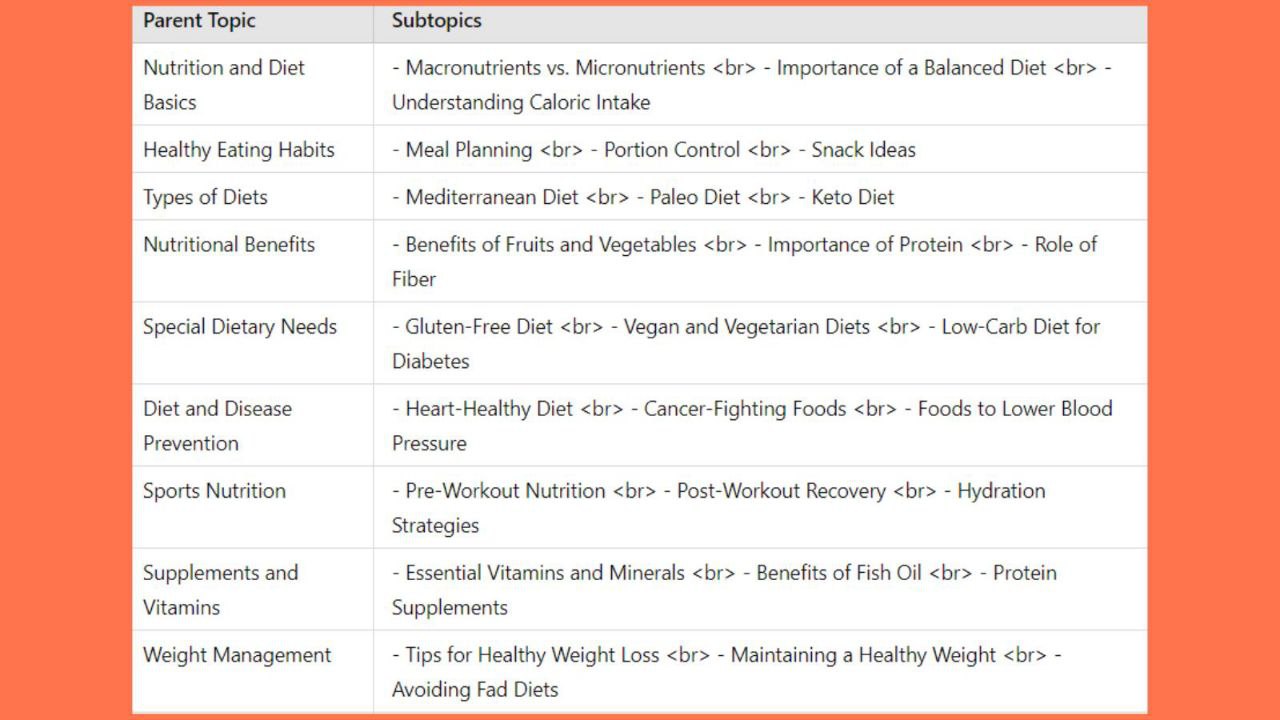
Looking at this table, you may discover exciting topics to delve into. ChatGPT can also help you group these topics by content type.
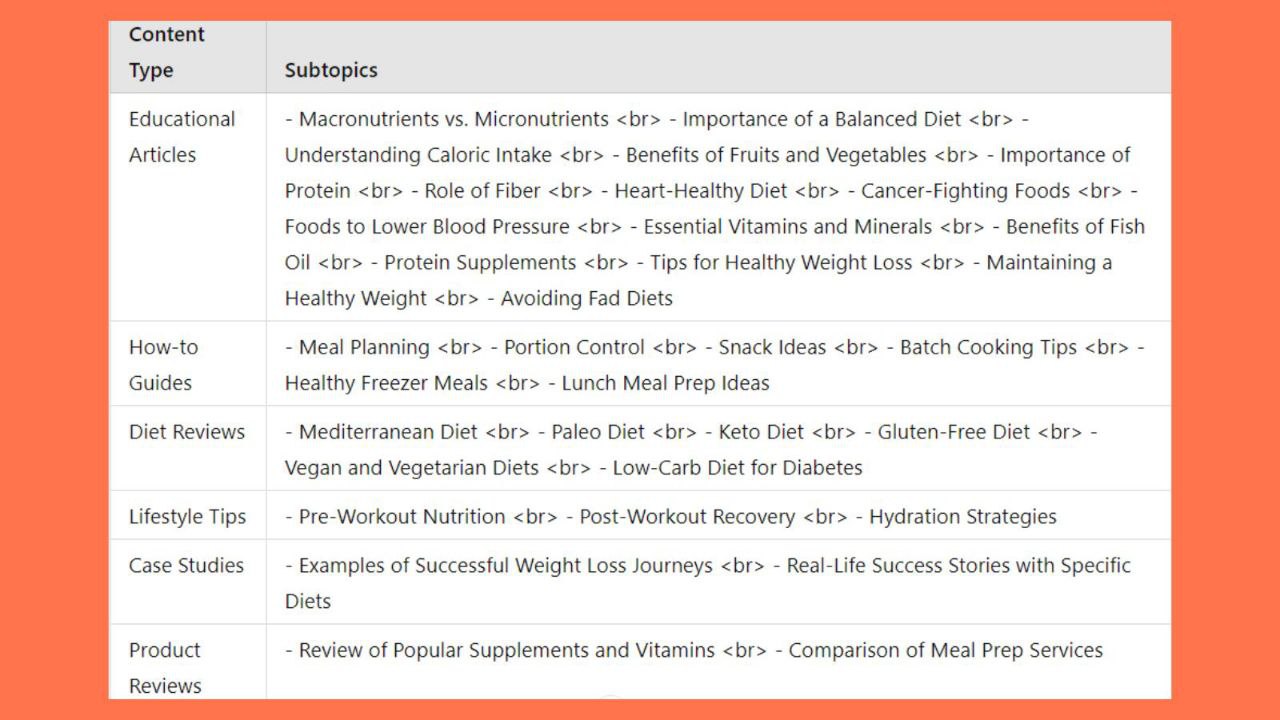
Draw Up a Content Outline
To kickstart the writing process, you need an outline. It serves as a roadmap for organizing your thoughts and structuring your content. ChatGPT can effortlessly help you with this task as well.
In seconds, the AI tool creates a draft for your blog post with multiple subsections and key points, saving you time and effort. To get the most accurate results, we suggest making the prompt as detailed as possible. Specify the target audience, number of headings, tone of voice, etc.
We asked ChatGPT to map out a plan for the article using the following prompt: “Create an outline for the blog topic “heart-healthy diet.” Mind your target audience: health enthusiasts, people with a family history of heart disease, and individuals concerned about their weight.”
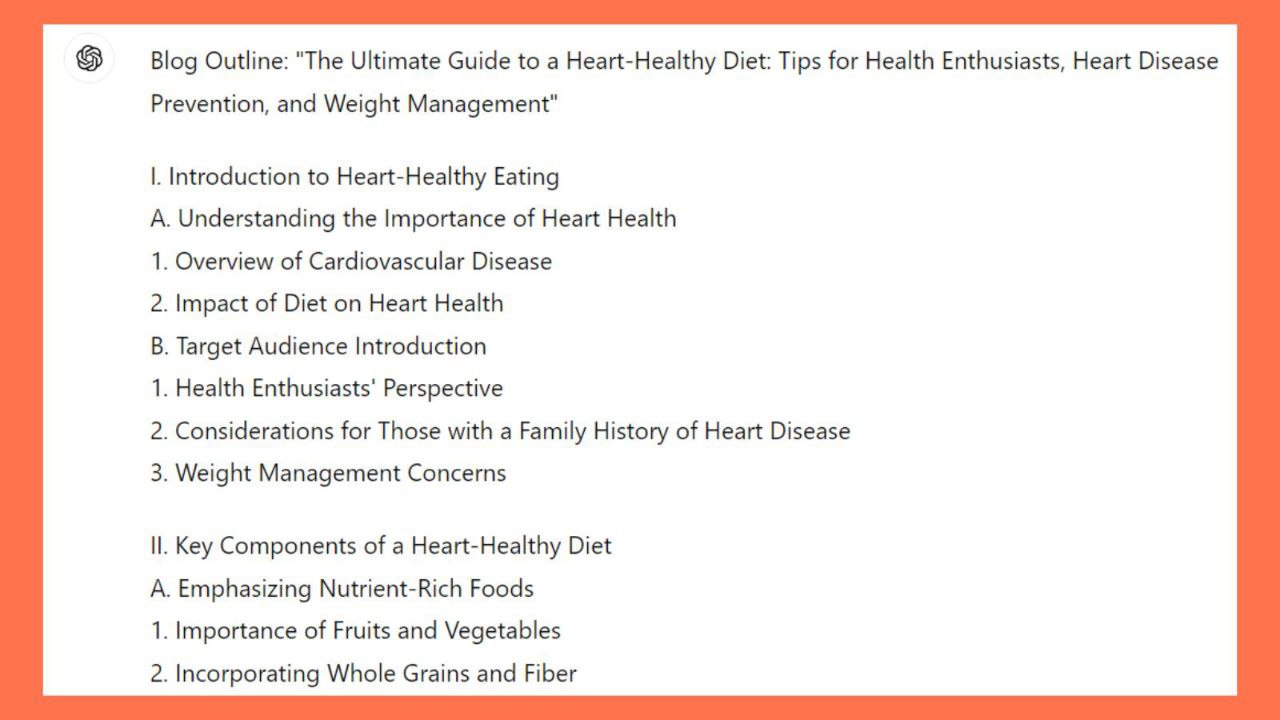
Write Content to Increase User Engagement
Think of ChatGPT as a reliable writing companion for creating engaging articles. You shouldn’t expect it to craft an SEO-optimized piece that meets Google’s E-E-A-T guidelines (Experience, Expertise, Authority, and Trust).
Relying solely on the AI-powered chatbot to generate content is a slippery slope, actually. ChatGPT summarizes everything it knows from the training data set and applies its next-token prediction capability to formulate answers. The output can be unoriginal, stuffed with keywords, and, overall, seem robotic. This may potentially hurt your SEO as Google penalizes spammy and low-quality texts.
Make sure to carefully review, fact-check, and adapt the content before publishing it. Add examples, statistics from trusted sources, and some human touch so that your final piece resonates with your target audience, brings value to them, and establishes your brand as a credible one.
Compile FAQs for a Blog Post
A frequently asked question page/section, or FAQ for short, is a valuable resource for providing users with quick and helpful answers to common queries. An FAQ section adds value to the article and boosts its ranking in Google’s “People Also Ask” feature.
All you need to do is feed ChatGPT a corresponding prompt, and it will list the most common questions and answers related to the topic. Look what the bot generated for us when we asked it to single out three typical questions and give short replies about a “heart-healthy diet.”
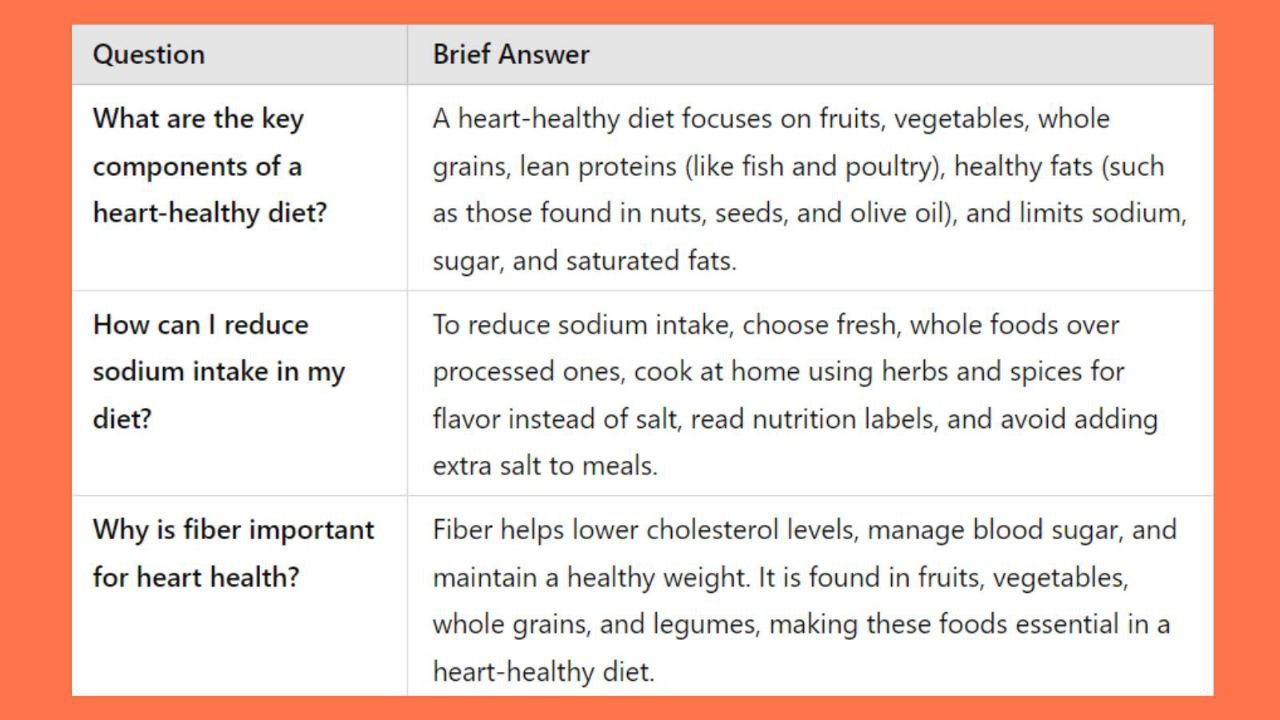
Generate Ideas for Meta Titles and Descriptions
Managing meta information is an essential step when optimizing websites for SEO. Title tags and meta descriptions are key components of metadata. Their main purpose is to give a summary of the webpage’s content.
Eye-catching title tags and meta descriptions can encourage users to click on your website. With ChatGPT, you won’t have difficulty writing compelling and persuasive meta tags for your website.
See it for yourself. We fed ChatGPT the following prompt: “Give me three ideas for a meta title and meta description for a landing page to buy organic nut butter. Keep the title tag under 60 characters and the meta description under 155.” Here’s what it came up with.
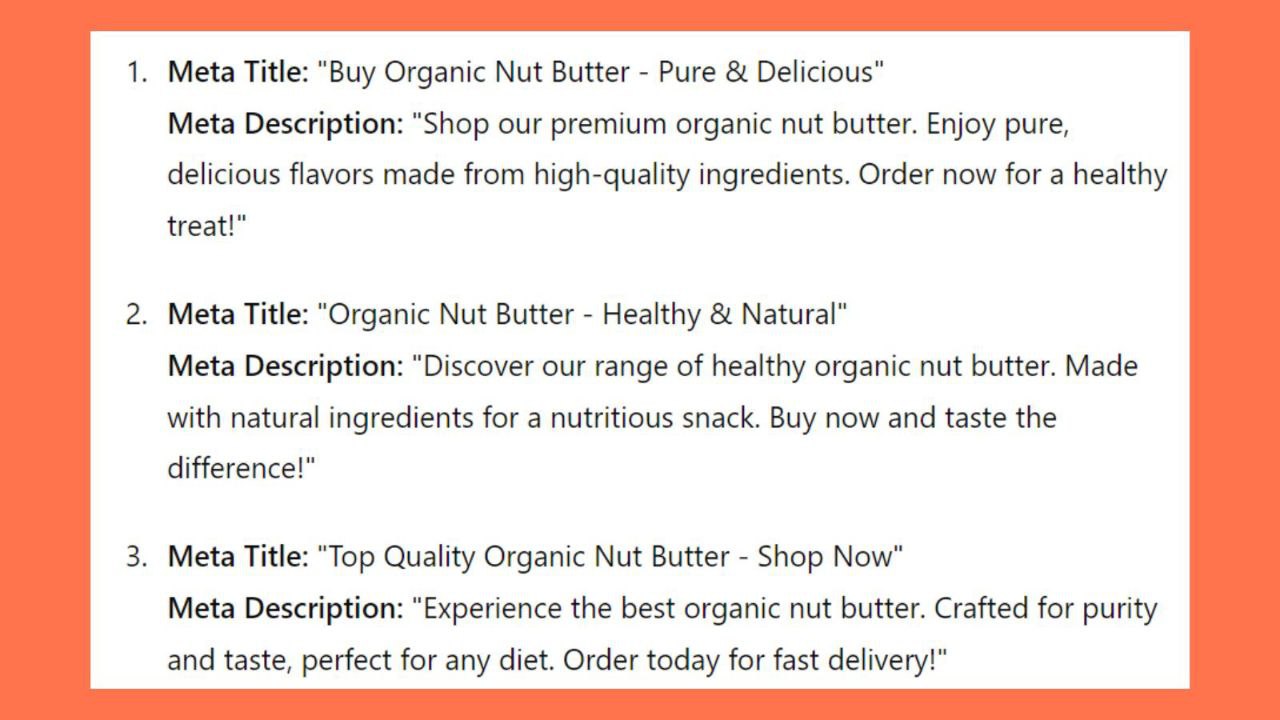
Create Structured Data Markup
Structured data, or schema markup, is a code language that helps search engines decipher your website content. Google bots use it to display informative results in SERPs, a.k.a. rich snippets. For example, schema markup is your go-to solution if you want a company address, logo, or ratings to appear in search results.
What if you’re swamped with work and have no time to manage structured data? Let the smart chatbot handle this task for you. With ChatGPT’s assistance, you can easily generate schema markup for any necessary data, including prices, ratings and reviews, FAQs, etc. Check out the example below.
Prompt: “Generate schema markup for this FAQ: What are the main components of a heart-healthy diet?
Answer: A heart-healthy diet focuses on vegetables, fruits, lean proteins (like fish and poultry), whole grains, healthy fats (such as those found in nuts, seeds, and olive oil) and limits sodium, sugar, and saturated fats.”
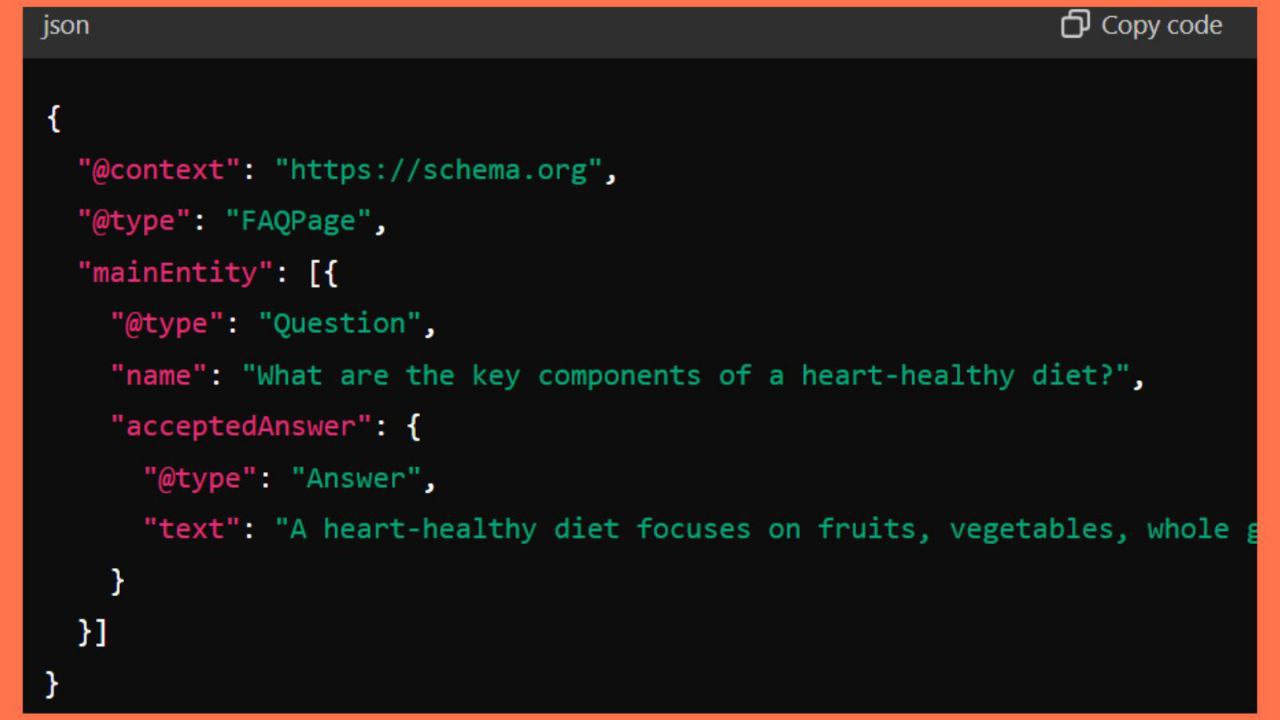
To be on the safe side, consider checking if the code is correct. The Schema Markup Validator on Schema.org is a great tool for determining any errors or discrepancies.
Craft Outreach Emails to Secure Backlinks
ChatGPT can speed up the process of writing outreach emails, as well as help generate catchy subject lines. This way, your emails won’t get lost in crowded inboxes or simply end up in a spam folder.
The more personalized messages you create, the higher your chances of earning backlinks. First, do some research and learn about the target website, its audience, and the type of content it publishes. Based on this information, you can tweak the prompt and craft the best possible email that speaks directly to the recipient’s needs.
Considering ChatGPT’s Limitations for SEO
ChatGPT is undeniably a valuable tool for elevating your SEO strategy. However, over-reliance on this large language model may play against your marketing efforts. Let’s focus on the key limitations and potential drawbacks the conversational chatbot may present regarding SEO.
Google’s Take on AI Content
Overall, Google doesn’t frown upon using automation or AI tools to generate content as long as it is original, valuable, high-quality, and meets E-E-A-T (expertise, experience, authoritativeness, and trustworthiness) standards. This is what the search engine giant writes in its guidelines:
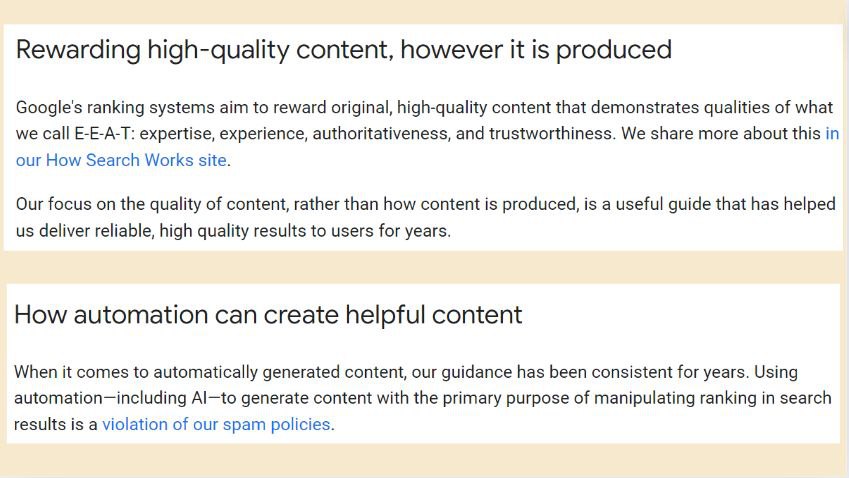
However, Google’s March 2024 Core Algorithm and Spam Update shook up the online world. Many websites saw a major drop in their ranking positions, and some were even removed completely from search results. The main targets for the crackdown were sites prioritizing unoriginal AI-generated content and manipulative SEO techniques.
That brings us back to the idea mentioned in the beginning: if you’re striving for success in search, focus on producing relevant and helpful content and consider AI a great writing sidekick, not a replacement for human expertise and creativity.
Lack of Originality
If you need to brainstorm ideas, break through a creative block, or find new angles on familiar topics, ChatGPT is your reliable assistant. The OpenAI model has been trained on large amounts of text data from three primary sources: publicly available and proprietary information and data provided by users or human trainers.
The conversational chatbot excels at formulating relevant responses quickly using its learning base. However, beware that the output may be similar to existing content, which may lead to plagiarism or duplicate content issues.
Nothing has beaten the creativity and originality of human writers so far. Therefore, it’s crucial to review and edit your AI-generated piece thoroughly to ensure it’s unique, useful, and SEO-optimized.
Incorrect Outputs
Fact-checking and critical thinking are integral when it comes to evaluating ChatGPT’s outputs. The thing is, the AI chatbot is prone to “hallucinations” and can make things up. It’s basically programmed to analyze and mimic how people use language rather than explicitly verify every detail.
That said, you shouldn’t copy and paste the generated content straight onto the website. For SEO purposes, where accuracy is key, carefully examine important information with reliable resources.
Limited Access to Real-Time Data
ChatGPT’s knowledge has certain restrictions. Depending on the model, the conversational chatbot may be unaware of the most recent events. As of today, GPT 3.5 and GPT-4 have the cutoff dates for their training data up to January 2022 and April 2023, respectively. Meanwhile, ChatGPT-4o, released on May 13, 2024, has its knowledge database updated through May 2023.
Meanwhile, SEO is a constantly changing game. Marketers should stay current with the latest algorithms and trends to ensure their website ranks well in search. It’s best to get the scoop from reputable resources and deem ChatGPT as a tool for complementing your SEO strategy rather than depending solely on it.
Embracing AI SEO Strategies Smartly
There you have it. ChatGPT proves to be a valuable addition to your SEO toolkit. It can improve various aspects of an SEO strategy, such as:
- brainstorming keyword ideas;
- mapping out content structure;
- fleshing out an outline with engaging and relevant information;
- creating compelling meta titles and descriptions;
- generating schema markup;
- and more.
Given the wide scope of SEO tasks ChatGPT can assist with, it shouldn’t be seen as a replacement for skilled professionals, though. The conversational chatbot has certain limitations regarding originality, knowledge of the most current events, and accuracy.
To achieve great results in your SEO project, it’s essential to combine generative AI with human effort. This can help boost website rankings and drive targeted traffic.
